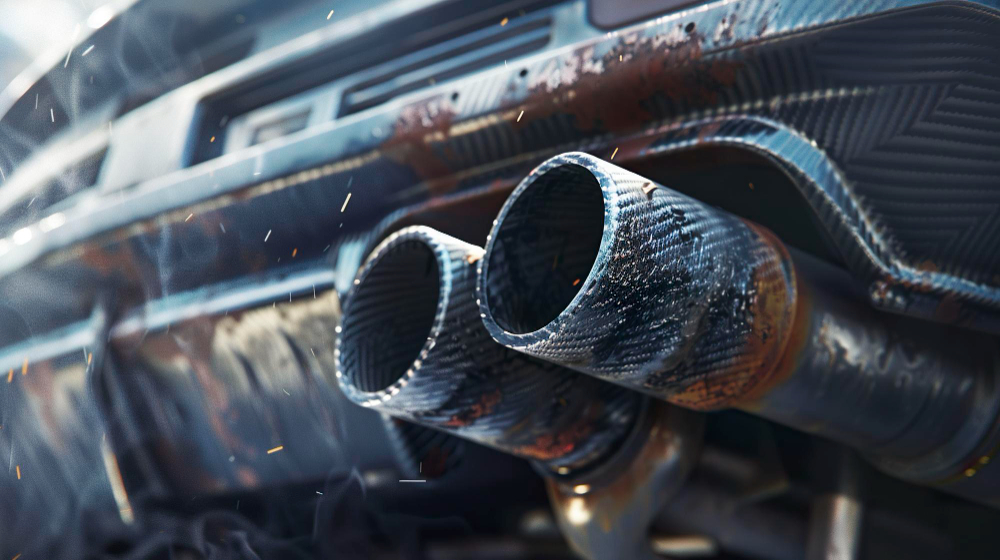A vehicle’s muffler is not only an exhaust part but one of the most critical components that define your car’s sound profile and dynamics. Getting advice from a trusted auto repair Houston can help you understand how different muffler types affect performance and noise levels.
Knowing the various types of mufflers and their performance impact is beneficial for those who own cars and those who are interested in automobiles.
If you’re searching for ‘auto repair near me,’ we’re here to help — book your service today.
What is a Muffler?
A muffler is part of the vehicle exhaust system and is constructed to diminish the sound made by the engine’s exhaust gases.
However, it is not just about noise reduction. The design of a muffler can greatly affect the efficiency of the engine and the performance of the car.
How Do Mufflers Work?
In its simplest form, a muffler absorbs and scatters sound waves produced by exhaust gases.
After these gases are released from the engine, they pass through pipes and enter the muffler, where they pass through chambers and passages.
This setup employs destructive interference, a process whereby two out-of-phase sound waves eliminate each other, decreasing the sound produced from the tailpipe.
The typical muffler consists of several components:
Resonating Chamber:
This part of the muffler is designed to create sound waves that cancel out the noise from the engine.
Perforated Tubes:
These tubes allow exhaust gases to pass through while reflecting sound waves.
Sound-Absorbing Material:
Usually made of fiberglass or other materials, this layer absorbs sound energy, further reducing noise.
By manipulating the size, shape, and materials of these components, manufacturers can design mufflers to produce specific sound profiles and performance characteristics.
What Are Different Types of Mufflers Available in Market?
Chambered Mufflers
Chambered mufflers are the muscle cars essence, famous for their deep, aggressive rumbling sounds that turn heads on the street.
Inside, it is a series of chambers connected by short tubes that reflect sound waves at certain frequencies and cancel them out.
This setup is not only about sound; the correct configuration can also increase the performance by a few percent due to better exhaust gas flow.
However, the internal complexity may cause back pressure that could reduce the engine efficiency a little in some conditions. To solve this problem, you need to stay on top with exhaust system repair services.
Stock Mufflers
Factory exhausts are also known as stock mufflers or OEM (Original Equipment Manufacturer) mufflers, and are fitted as standard equipment in vehicles.
They are intended to offer solutions that are capable of reducing noise while at the same time being cheap and efficient.
These are usually designed to present a stock-like or smooth note, which makes them suitable for daily use.
However, they might not give the best results in terms of performance enhancement to meet the demands of enthusiasts.
Performance Mufflers
The performance mufflers are made in way that they allow better exhaust gases flow to help in improving the performance of the engine.
These mufflers are commonly known to have straight through designs, which enable the exhaust gasses to pass through with ease and with minimal hindrance.
This design can create a louder and rougher sound of the exhaust manifold, which is preferred by many people who love their cars.
Performance mufflers can also contribute to a marginal increase in horsepower and torque because of the enhanced exhaust efficiency.
Glasspack Mufflers
Cherry bombs or Glasspack mufflers are a type of performance muffler that have a straight through design. They encompass a perforated tube with fiberglass sound-packing material.
This design does not cause much restriction of exhaust gases hence providing a loud and deep exhaust tone. Glasspack mufflers are very well-known in the hot rod and muscle car markets for their tone.
Turbo Mufflers

Turbo mufflers are similar to the chambered and straight-through mufflers, but they are combined into one.
They incorporate a sequence of perforated tubes and sound deadener materials that make less sound than straight-through mufflers whilst providing satisfactory exhaust gases expulsion.
Turbo mufflers give a fair measure of boost and a good sound that most people find desirable.
Diesel Mufflers
To clarify, diesel and gasoline engines emit different pitches of sound that need different mufflers.
Diesel mufflers, on the other hand, are developed to withstand higher pressure and temperature, which is characteristic of diesel emissions.
They usually contain more extensive compartments and are made of heavier materials to accommodate the diesel engine requirements.
Choosing the Right Muffler For Your Car
Selecting the right muffler depends on your priorities: sound, performance, or a balance of both.
Sound Preference:
Determine the exhaust note you desire. If you prefer a quiet ride, a stock or turbo muffler may be ideal.
For a louder, more aggressive sound, consider a performance or glass pack muffler.
Performance Goals:
If you aim to maximize performance, look for mufflers with minimal exhaust restrictions, such as straight-through designs.
Performance mufflers and glass packs can provide slight gains in horsepower and torque.
Vehicle Type:
The type of vehicle you drive can influence your muffler choice. Diesel engines, for example, require specialized mufflers designed to handle higher pressures and temperatures.
Legal Considerations:
Be aware of local noise regulations. Some performance mufflers and glass packs may exceed legal noise limits, leading to fines or required modifications.
Material and Construction:
Consider the materials used in the muffler. Stainless steel mufflers offer greater durability and resistance to corrosion compared to aluminized steel.
Installation and Compatibility:
Ensure the muffler you choose is compatible with your vehicle’s exhaust system. Some mufflers may require additional modifications or adapters for proper installation.
Takeaway
Mufflers are a crucial component of a vehicle’s exhaust system, influencing both sound and performance.
From the quiet efficiency of stock mufflers to the aggressive roar of performance designs, there’s a muffler to suit every preference and driving style.
By understanding the different types of mufflers and their impacts, you can make an informed decision that enhances your vehicle’s performance and sound profile. Moreover, if there has been a problem with your muffler and you want to get it checked then you can contact Erics Car Care at 713-667-9293 as they have the best mechanics in town.

